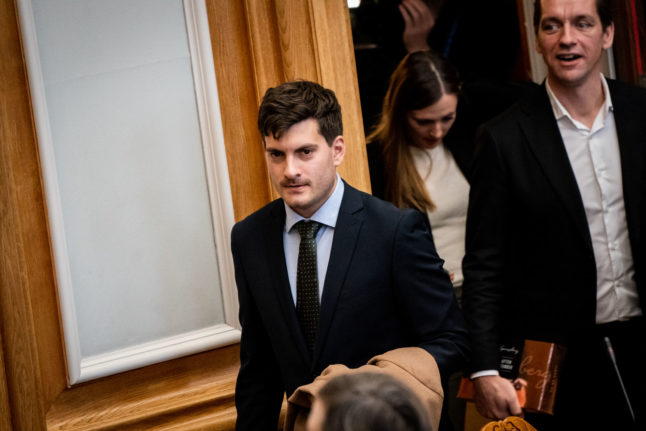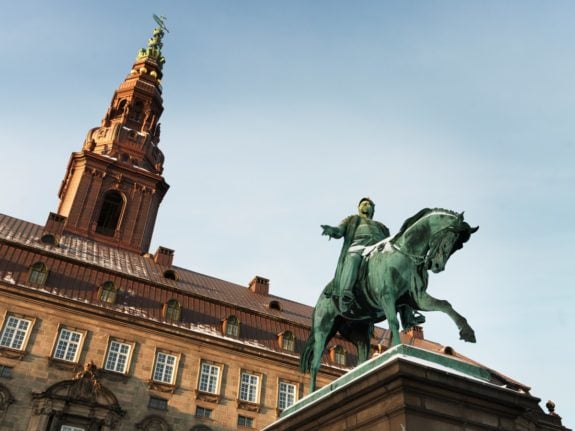Internal dispute within Denmark’s Social Democrats has gained pace and drawn comments from Prime Minister Mette Frederiksen, after one of the party’s MPs recently made a divisive speech in parliament.
Frederik Vad, who is the immigration spokesperson with the party, the senior partner in the coalition government, said earlier this month during a speech in parliament that Denmark’s immigration debate had to make an “admission”.
“That is an admission that work, education, a house, participation in associations and a clean criminal record are not enough on their own if you are also using your position to undermine Danish society from within,” Vad said.
“A parallel society is no longer a housing area in [underprivileged area] Ishøj. A could alos be a table at the canteen in a state agency or a pharmacy in [affluent] North Zealand,” he said, using the term used to refer to areas of the country subject to special integration laws.
To qualify as ‘parallel societies’, housing areas must have a population of more than 1,000 people, of which more than half are of “non-Western” origin, and must fulfil two of four criteria. For areas with fewer than 50 percent ‘non-Western’ populations, another term – ‘vulnerable area’ – is used instead.
The comments have received criticism from local Social Democratic politicians, initially more junior politicians such as town councillors and later gaining momentum with some city mayors speaking out against Vad, as reported by broadcaster DR.
“Frederik Vad is stigmatising a large part of the population that consists of well-educated, well-integrated and active citizens who contribute to Denmark every single day,” Musa Kekec, a Social Democratic member of the municipal council in Ballerup, told DR.
“We do not appreciate it. It is creating a new myth that integration has failed and that it’s no longer good enough to get an education, speak Danish, contribute to society and have a job – more is required,” he said.
Kekec is one of 18 elected local Social Democratic officials to have sent a letter to the party leadership earlier this week, objecting to Vad’s position.
“It’s important for us to show that we disagree with the rhetoric and suspicion being spread on the part of Frederik Vad,” Kekec said.
The internal conflict over the issue between parliamentary and local Social Democratic politicians is unusual in a party known for a culture in which all members loyally stick to the course set out by party leadership.
Merete Amdisen, the mayor of Ishøj – the municipality singled out by Vad in his comments – was the first mayor to publicly reject them, but several others have since added their voices to the dissent.
“I think you should think very carefully when you speak about people who go to work every single day, look after their children, integrate themselves in society and take part in our associations, in fact do everything we want them to, and who we also happen to need on our labour market,” Gladsaxe mayor Trine Græse told DR.
“I was actually offended – not personally, because I’m not in the target group. But when I heard what he said, I thought ‘that’s not a nice thing for him to say’,” she said.
“Christiansborg politicians should use their powerful voices with consideration and respect for others. Generalisations and pointing the finger at citizens with a different ethnic background as potentially dangerous are the wrong way to go,” the mayor of Furesø, Ole Bondo Christensen said.
In comments earlier this week, Prime Minister Mette Frederiksen said there was “full support” for Vad from the party leadership.
“There is an ongoing immigration debate within the Social Democrats and in Denmark, but the Social Democrats stand firm on the immigration policy that is currently being pursued in Denmark,” the PM told DR.
“I do not see any stigmatising comments from Frederik. I think he does a good job of pointing out that — of course — you cannot speak generally about everyone. On the contrary, many [immigrants] are doing very well. But those who, for example, commit crime, violence, or are members of [Islamist organisation] Hizb ut-Tahrir, are against our democracy. That is a lack of integration and we must then be able to discuss it,” she said.
Vad has not presented any data to support the claim that people of non-Western immigrant backgrounds with high levels of education and employment are involved in activities of the kind described by Frederiksen.
The junior Social Democratic MP defended his comments by saying they were not a deviation from the existing party line.
“That line is that we have a few problems in some pockets of our society with some people who are educated, have a job and a clean criminal record, yet bring some values with them to work which are problematic,” he said to DR.
“It makes me sad if there are people in the party who think I said something wrong. Personally, I don’t think I have. I made a nuanced statement,” he said.
“People who make an effort, work their socks off, and integrate [into society] with their children should receive nothing but respect and equality,” he said.
“But the people who insist on bringing a culture of honour to work, or who don’t think you need to subscribe to women’s freedom and equality to be part of this society, should see nothing but a hammer falling,” he said.



 Please whitelist us to continue reading.
Please whitelist us to continue reading.
Member comments